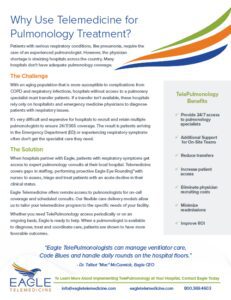Why is this information relevant to the demand for TelePulmonology?
Many of these same states have a high percentage of rural patients and aging populations. In addition, the Centers for Disease Control and Prevention (CDC) reports that the age adjusted prevalence of COPD is above 7% in 13 states with predominantly rural populations, including Arkansas, Indiana, Kentucky, Missouri, Ohio, Tennessee and West Virginia.
The CDR also reports that cigarette use by adults is over 21% in Arkansas, Kentucky and West Virginia. Indiana, Missouri, Ohio and Tennessee have smoking rates above 18%. Do you see a pattern? Telemedicine for pulmonology can diagnose and treat patients with a variety of crisis and chronic lung conditions.
To meet the needs of patients in rural communities, Eagle Telemedicine offers TelePulmonology services on-call or by scheduled consult. These services benefit hospitals and patients by:
- Increasing access to specialists in communities where pulmonologists are often not available or in limited supply – meaning getting a pulmonologist to perform a consult at night in the Emergency Department is rare.
- Improving care coordination and lowering hospital readmission rates by developing a treatment plan with input from a pulmonologist.
- Improving hospital revenue by adding services, when required for patient care.
- Reducing transfers that are inconvenient to patients while boosting the average daily census at the local hospital.
- Offering more robust outpatient follow-up for patients treated for pulmonary infections and diseases during an inpatient stay.
